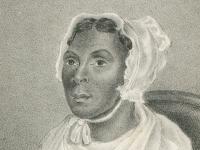PHILADELPHIA, PA—Join the Historical Society of Pennsylvania (HSP) for a free workshop on March 9, 2017 at 1:00 p.m. exploring a new digital resource available for genealogists researching African American ancestors.
"Last Seen": Finding Family after Slavery offers researchers a new tool for telling family stories of separation and survival during slavery, emancipation, and the Civil War. The digital resource offers easy access to digitized "Information Wanted" advertisements placed in newspapers by former slaves and United States Colored Troops searching for family members lost by sale, flight, or enlistment.
The ads mention family members, often by name, but also by physical description, circumstances of separation, last seen locations, and at times by the name of a former slave master. The earliest ads appeared in papers in 1863, and they continued for more than thirty years. "Last Seen": Finding Family after Slavery allows users to search these ads by proper names, locations, circumstances of separation, military regiments, and events.
The free March 9, 2017 workshop will debut the prototype site—including more than 800 of these ads—that will open up new avenues for researching family history. Participants are encouraged to bring their laptop.
This project is made possible by a partnership between the Graduate Program in History at Villanova University and Margaret Jerrido, archivist at Mother Bethel African Methodist Episcopal Church. Ms. Jerrido is recruiting and coordinating volunteers and will be at the workshop to work with attendees.
For a sneak preview of the site—and if you’d like to sign up to transcribe—click here or visit http://informationwanted.org/
Speaker's Bio: Judith Giesberg is a professor and director of graduate studies in the department of history at Villanova University. She is the author of four books on the Civil War era: Civil War Sisterhood: The United States Sanitary Commission and Women's Politics in Transition (2000); "Army at Home": Women and the Civil War on the Northern Home Front (2009); Keystone State in Crisis: Pennsylvania in the Civil War (2013); and Emilie Davis's Civil War: The Diaries of a Free Black Woman in Philadelphia, 1863–1865 (2014). Her current projects include a manuscript on pornography and sexual culture in U.S. Army camps during the Civil War.

